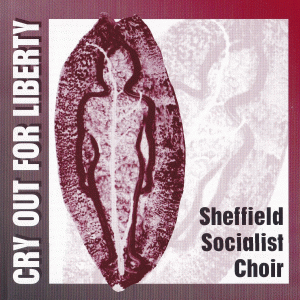This was recorded in 1999 at the University of Sheffield Theatre Workshop, the same year as we published our 10th anniversary songbook ‘With One Voice’. Engineer: Ian Stead.
Maliswe This is one of a number of songs we sing which have links with the South African anti-apartheid movement. The words are drawn from a variety of South African languages and express a longing for home.
Lives in the Balance Jackson Browne, who founded a musicians’ movement against US militarism in Central America, wrote this song in response to interventions in Nicaragua, El Salvador and Grenada in the 1980s. For us, its meaning has grown to encompass events in the Gulf and elsewhere in the 1990s. This arrangement is by Mike Reid of our choir.
Daughters and Sons Tommy Sands who comes from a celebrated family of musicians from County Down in Northern Ireland, has now launched a solo career as a singer-songwriter. Recently he has been active in support of the Good Friday Agreement. This song is from his 1985 album,’Singing of the Times.’ The arrangement we sing is by Tony Wilde, a former member of our choir.
Mzi Wase Afrika Written by the late B B Myataza, who wrote many choral pieces for the choirs of the South African townships, this song looks forward to a new non-racial South Africa integrating itself into the African continent. We learned this song from a recording by the Langa Adult Choir of the Langa township in Cape Town, sent to us in 1994.
Everything Possible Written by Canadian singer-songwriter Fred Small, we sing an arrangement by Madge Woollard from our choir. This lullaby was written for the son of a lesbian friend to challenge stereotypes and to encourage him to be true to himself.
Helele The first part of this song is in Tetun and celebrates the courageous struggle of the East Timorese against the brutal Indonesian occupation. The second was written in solidarity by Stephen Taberner, who taught us the song while on a visit from Australia. A member of our choir has recently returned from working with the United Nations’ mission, monitoring the historic vote in which 80% of the East Timorese population resisted horrendous intimidation to vote for their political freedom. This makes the song all the more powerful for us.
The World Turned Upside Down Composed by Leon Rosselson and popularised by Billy Bragg, who heard it performed at a national CND Conference in Sheffield City Hall in the early 1980s. The song tells the story of the Diggers, a land rights movement of the English Revolution. Our version is based on an arrangement by former choir member, Jane Edwardson.
Narini We learned this song from Batanai, an Aids support group in Masvingo, Zimbabwe and sang it to welcome them to a conference in Sheffield in 1997. The song, sung in Shona, calls on people to work together to end the stigma against those with Aids.
How Long Watchman? Through discordant themes and disturbing imagery, this song describes the chaos and terror of nuclear destruction. Written by Malcolm Dalglish, it borrows from two South Carolina hymns: a southern harmony spiritual depicting Armageddon and an African American gospel song traditionally sung to welcome the New Year. Each hymn is based on the Book of Revelations.
Change for the Better Helen Malone’s lyrics, put to music by Jon Farley, were written in the closing months of John Major’s Government and set out an agenda for political and social change.
Sitholele From South Africa, Sitholele means `We’ve got freedom’. It was sung at the inauguration of Nelson Mandela as President, after the country’s first ever democratic elections in 1994.
Motorway Song This Leon Rosselson song, arranged by Vicki England and adapted by Nigel Wright was first performed in 1972 when the UK government was undertaking an extensive motorway building programme. The 1990’s have seen a massive upsurge in popular and imaginative protests against road building.
Don’t Fence Me In Women of the choir enjoy singing `Don’t fence me in.’ This arrangement of the well-known Cole Porter song is by Jane Edwardson.
Hymn of the Big Wheel This comes from Massive Attack’s Blue Lines album and is arranged by Mike Reid. In the song, a father talks to his son, troubled by the threatened destruction of the earth and by social inequality. He sees in the daily turning of the world a symbol of movement and change. The father’s hope for a new world for his child confronts his feelings of helplessness at the enormity of the environmental and social wrongs which are demanding to be addressed.
Yo Te Nombro, Libertad / I Cry Out For Liberty The detention in the UK of General Pinochet has given us an updated context for our performances of this song, which was originally sung at the beginning of meetings of the Chilean anti-torture movement in the 1970s and 1980s. In their long campaign for justice, the `Families of the Disappeared’ have sung this to keep their loved ones alive in the hearts of the people: “For everyone in our country, now I call you by your true name…”
Unison in Harmony The Nottingham Clarion Choir performed this song to mark the opening of the East Midlands branch of Unison, the public sector workers’ trade union. It was written by South Yorkshire-based trio: Coope, Boyes and Simpson and first sung publicly by our choir at the National Street Music Festival in Leicester.
Auf den Strassen zu Singen This song captures the atmosphere of the workers’ movement in the Weimar Republic in Germany in the 20’s and conveys a sense of optimism in the face of the terrifying growth of fascism. The music was composed by Hans Eisler and the lyrics are by Robert Gilbert. ‘Singing in the Streets’ has presented us with our greatest musical challenge so far!
To buy this CD, contact CDSales@socialistchoir.org.uk

